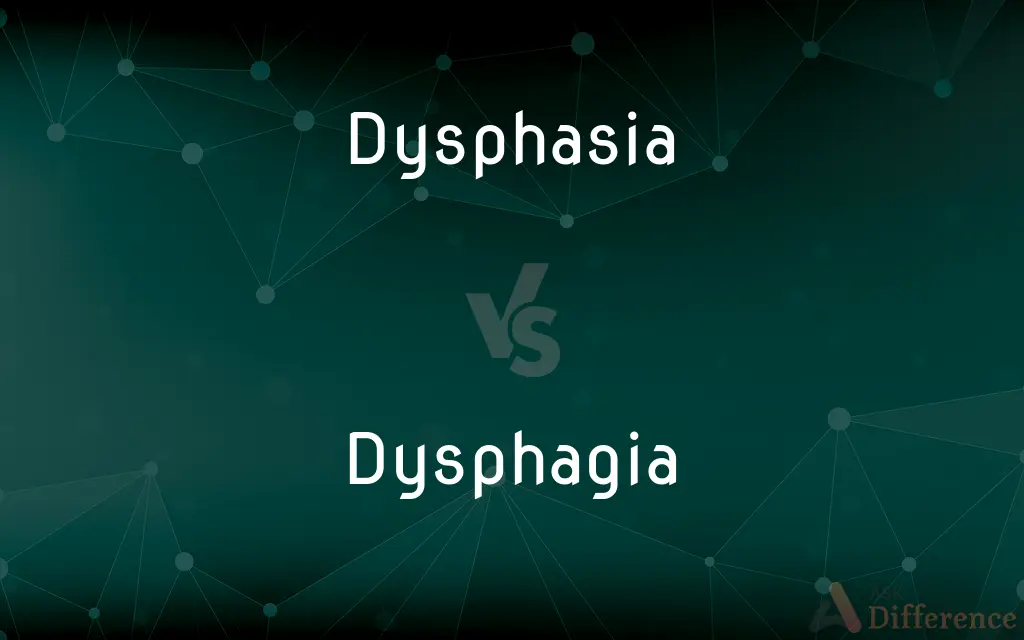Dysphasia vs. Dysphagia — What's the Difference?
By Tayyaba Rehman — Updated on December 10, 2023
Dysphasia is a language disorder affecting speech, comprehension, reading, or writing. Dysphagia is a condition characterized by difficulty in swallowing.

Difference Between Dysphasia and Dysphagia
Table of Contents
ADVERTISEMENT
Key Differences
Dysphasia affects communication abilities, impairing the ability to use or understand words. Dysphagia involves difficulty in the physical act of swallowing, which can affect eating and drinking.
Dysphasia can manifest as trouble finding words, forming sentences, or understanding speech. Dysphagia may present as coughing, choking, or discomfort during swallowing.
The causes of dysphasia often include neurological disorders such as stroke or brain injury. Dysphagia can be caused by conditions affecting the throat or esophagus, like muscle disorders or cancer.
Treatment for dysphasia usually involves speech and language therapy. Dysphagia management may include diet modification, swallowing therapy, or medical interventions.
Dysphasia can significantly impact social interactions and quality of life due to communication challenges. Dysphagia poses risks like malnutrition and aspiration pneumonia, impacting overall health.
ADVERTISEMENT
Comparison Chart
Definition
Language disorder affecting communication
Difficulty in swallowing
Symptoms
Impaired speech, comprehension
Coughing, choking while swallowing
Common Causes
Neurological issues (e.g., stroke)
Throat/esophagus conditions
Treatment
Speech therapy
Swallowing therapy, diet modification
Impact on Daily Life
Affects communication and social interaction
Affects eating, drinking, nutrition
Compare with Definitions
Dysphasia
A condition that affects the ability to communicate verbally or through writing.
After his stroke, he experienced dysphasia, struggling to find the right words.
Dysphagia
A medical condition involving difficulty in swallowing.
Dysphagia made it hard for him to swallow his food without choking.
Dysphasia
A language disorder caused by brain damage affecting speech and comprehension.
Dysphasia made it difficult for her to follow conversations.
Dysphagia
Difficulty that occurs in the oral or pharyngeal phase of swallowing.
Dysphagia therapy helped him improve his swallowing technique.
Dysphasia
Difficulty in expressing thoughts through language or understanding spoken words.
Dysphasia affected her ability to communicate her needs effectively.
Dysphagia
A swallowing disorder that can lead to aspiration or malnutrition.
Due to dysphagia, she was at risk of pneumonia from aspiration.
Dysphasia
Impairment in the production or understanding of speech.
He received speech therapy to help manage his dysphasia.
Dysphagia
A symptom of various medical conditions affecting the throat or esophagus.
Her dysphagia was a result of esophageal cancer.
Dysphasia
A neurological disorder impacting reading, writing, and language processing.
She used alternative communication tools to cope with dysphasia.
Dysphagia
A condition that can cause pain or discomfort during swallowing.
Eating became a challenge for her because of severe dysphagia.
Dysphasia
Impairment of speech and verbal comprehension, especially when associated with brain injury.
Dysphagia
Difficulty in swallowing.
Dysphasia
(pathology) Loss of or deficiency in the power to use or understand language as a result of injury or disease of the brain.
Dysphagia
(pathology) Difficulty in swallowing.
Dysphagia
Dysphagia is difficulty in swallowing. Although classified under "symptoms and signs" in ICD-10, in some contexts it is classified as a condition in its own right.It may be a sensation that suggests difficulty in the passage of solids or liquids from the mouth to the stomach, a lack of pharyngeal sensation or various other inadequacies of the swallowing mechanism.
Dysphagia
Difficulty or discomfort in swallowing, as a symptom of disease
Progressive dysphagia
Dysphagia
Difficulty in swallowing.
Dysphagia
Condition in which swallowing is difficult or painful
Common Curiosities
What is dysphagia?
Difficulty or discomfort in swallowing.
Is dysphagia a serious condition?
It can be, as it affects nutrition and poses a risk of aspiration.
Can children have dysphasia?
Yes, it can occur in children, often due to developmental issues or brain injury.
What causes dysphasia?
Often caused by brain injury, stroke, or neurological conditions.
What are the treatment options for dysphagia?
Treatments include swallowing therapy, dietary changes, and sometimes surgery.
Does dysphasia affect intelligence?
No, it affects communication, not cognitive ability.
What is dysphasia?
A communication disorder affecting speech, comprehension, or writing.
Is dysphasia the same as aphasia?
Dysphasia is often used interchangeably with aphasia, but some differentiate them by severity.
How does dysphasia affect daily life?
It can impact social interaction, job performance, and overall quality of life.
Can dysphasia be cured?
It varies; some can improve significantly, while others may have long-term effects.
How is dysphagia diagnosed?
Through clinical evaluation and sometimes specialized tests like a barium swallow.
Are there specific foods to avoid with dysphagia?
Yes, often hard, sticky, or very dry foods are avoided.
Can dysphagia lead to other health problems?
Yes, like malnutrition, dehydration, and aspiration pneumonia.
Can technology assist people with dysphasia?
Yes, assistive technologies like speech-generating devices can be helpful.
Can dysphagia be temporary?
Yes, it can be temporary or chronic, depending on its cause.
Share Your Discovery

Previous Comparison
Monument vs. Memorial
Next Comparison
Coworker vs. ColleagueAuthor Spotlight
Written by
Tayyaba RehmanTayyaba Rehman is a distinguished writer, currently serving as a primary contributor to askdifference.com. As a researcher in semantics and etymology, Tayyaba's passion for the complexity of languages and their distinctions has found a perfect home on the platform. Tayyaba delves into the intricacies of language, distinguishing between commonly confused words and phrases, thereby providing clarity for readers worldwide.













































